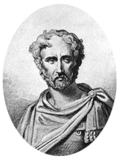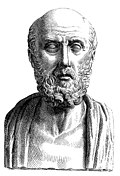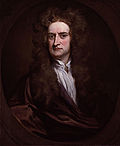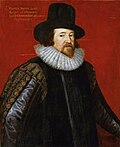Portal:History of science
The History of Science Portal
The history of science covers the development of science from ancient times to the present. It encompasses all three major branches of science: natural, social, and formal. Protoscience, early sciences, and natural philosophies such as alchemy and astrology that existed during the Bronze Age, Iron Age, classical antiquity and the Middle Ages, declined during the early modern period after the establishment of formal disciplines of science in the Age of Enlightenment.
Science's earliest roots can be traced to Ancient Egypt and Mesopotamia around 3000 to 1200 BCE. These civilizations' contributions to mathematics, astronomy, and medicine influenced later Greek natural philosophy of classical antiquity, wherein formal attempts were made to provide explanations of events in the physical world based on natural causes. After the fall of the Western Roman Empire, knowledge of Greek conceptions of the world deteriorated in Latin-speaking Western Europe during the early centuries (400 to 1000 CE) of the Middle Ages, but continued to thrive in the Greek-speaking Byzantine Empire. Aided by translations of Greek texts, the Hellenistic worldview was preserved and absorbed into the Arabic-speaking Muslim world during the Islamic Golden Age. The recovery and assimilation of Greek works and Islamic inquiries into Western Europe from the 10th to 13th century revived the learning of natural philosophy in the West. Traditions of early science were also developed in ancient India and separately in ancient China, the Chinese model having influenced Vietnam, Korea and Japan before Western exploration. Among the Pre-Columbian peoples of Mesoamerica, the Zapotec civilization established their first known traditions of astronomy and mathematics for producing calendars, followed by other civilizations such as the Maya.
Natural philosophy was transformed during the Scientific Revolution in 16th- to 17th-century Europe, as new ideas and discoveries departed from previous Greek conceptions and traditions. The New Science that emerged was more mechanistic in its worldview, more integrated with mathematics, and more reliable and open as its knowledge was based on a newly defined scientific method. More "revolutions" in subsequent centuries soon followed. The chemical revolution of the 18th century, for instance, introduced new quantitative methods and measurements for chemistry. In the 19th century, new perspectives regarding the conservation of energy, age of Earth, and evolution came into focus. And in the 20th century, new discoveries in genetics and physics laid the foundations for new sub disciplines such as molecular biology and particle physics. Moreover, industrial and military concerns as well as the increasing complexity of new research endeavors ushered in the era of "big science," particularly after World War II. (Full article...)
Selected article -

Recurring cultural, political, and theological rejection of evolution by religious groups exists regarding the origins of the Earth, of humanity, and of other life. In accordance with creationism, species were once widely believed to be fixed products of divine creation, but since the mid-19th century, evolution by natural selection has been established by the scientific community as an empirical scientific fact.
Any such debate is universally considered religious, not scientific, by professional scientific organizations worldwide: in the scientific community, evolution is accepted as fact, and efforts to sustain the traditional view are universally regarded as pseudoscience. While the controversy has a long history, today it has retreated to be mainly over what constitutes good science education, with the politics of creationism primarily focusing on the teaching of creationism in public education. Among majority-Christian countries, the debate is most prominent in the United States, where it may be portrayed as part of a culture war. Parallel controversies also exist in some other religious communities, such as the more fundamentalist branches of Judaism and Islam. In Europe and elsewhere, creationism is less widespread (notably, the Catholic Church and Anglican Communion both accept evolution), and there is much less pressure to teach it as fact. (Full article...)
Selected image

"Fuji at Torigoe" is the eightieth woodblock print from One Hundred Views of Mt. Fuji by the Japanese ukiyo-e artist Hokusai. It depicts the observatory of the Calendar Bureau during the Edo period, with astronomers working on the roof, Mount Fuji in the background. According to Hokusai scholar Henry D. Smith II, the instrument is best seen as an indication of Hokusai's interest in Western science rather than a representation of Japanese astronomical practice.
Did you know
...that the history of biochemistry spans approximately 400 years, but the word "biochemistry" in the modern sense was first proposed only in 1903, by German chemist Carl Neuberg?
...that the Great Comet of 1577 was viewed by people all over Europe, including famous Danish astronomer Tycho Brahe and the six year old Johannes Kepler?
...that the Society for Social Studies of Science (often abbreviated as 4S) is, as its website claims, "the oldest and largest scholarly association devoted to understanding science and technology"?
Selected Biography -

Tycho Brahe (/ˈtaɪkoʊ ˈbrɑː(h)i, - ˈbrɑː(hə)/ TY-koh BRAH-(h)ee, - BRAH(-hə); Danish: [ˈtsʰykʰo ˈpʁɑːə] ⓘ; born Tyge Ottesen Brahe, Danish: [ˈtsʰyːjə ˈʌtəsn̩ ˈpʁɑːə]; 14 December 1546 – 24 October 1601), generally called Tycho for short, was a Danish astronomer of the Renaissance, known for his comprehensive and unprecedentedly accurate astronomical observations. He was known during his lifetime as an astronomer, astrologer, and alchemist. He was the last major astronomer before the invention of the telescope. Tycho Brahe has also been described as the greatest pre-telescopic astronomer.
In 1572, Tycho noticed a completely new star that was brighter than any star or planet. Astonished by the existence of a star that ought not to have been there, he devoted himself to the creation of ever more accurate instruments of measurement over the next fifteen years (1576–1591). King Frederick II granted Tycho an estate on the island of Hven and the money to build Uraniborg, the first large observatory in Christian Europe. He later worked underground at Stjerneborg, where he realised that his instruments in Uraniborg were not sufficiently steady. His unprecedented research program both turned astronomy into the first modern science and also helped launch the Scientific Revolution. (Full article...)
Selected anniversaries
- 1557 - Death of Petrus Apianus, German mathematician (b. 1495)
- 1652 - Birth of Michel Rolle, French mathematician (d. 1719)
- 1719 - Death of Philippe de La Hire, French mathematician and historian (b. 1640)
- 1774 - Birth of Jean-Baptiste Biot, French physicist (d. 1862)
- 1825 - Death of Johann Friedrich Pfaff, German mathemattician (b. 1765)
- 1851 - Birth of Charles Barrois, French geologist (d. 1939)
- 1882 - Birth of Percy Williams Bridgman, American physicist, Nobel laureate (d. 1961)
- 1889 - Birth of Paul Karrer, Swiss chemist, Nobel laureate (d. 1971)
- 1915 - Birth of Garrett Hardin, American ecologist (d. 2003)
- 1951 - Birth of Michael Hartley Freedman, American mathematician
- 1965 - Death of Edward Victor Appleton, English physicist, Nobel Prize laureate (b. 1892)
- 1980 - Death of Alexander Oparin, Soviet biochemist (b. 1894)
- 1994 - The first discoveries of extrasolar planets are announced by astronomer Aleksander Wolszczan
Related portals
Topics
General images
Subcategories
Things you can do
Help out by participating in the History of Science Wikiproject (which also coordinates the histories of medicine, technology and philosophy of science) or join the discussion.
Associated Wikimedia
The following Wikimedia Foundation sister projects provide more on this subject:
-
Commons
Free media repository -
Wikibooks
Free textbooks and manuals -
Wikidata
Free knowledge base -
Wikinews
Free-content news -
Wikiquote
Collection of quotations -
Wikisource
Free-content library -
Wikiversity
Free learning tools -
Wiktionary
Dictionary and thesaurus








































































